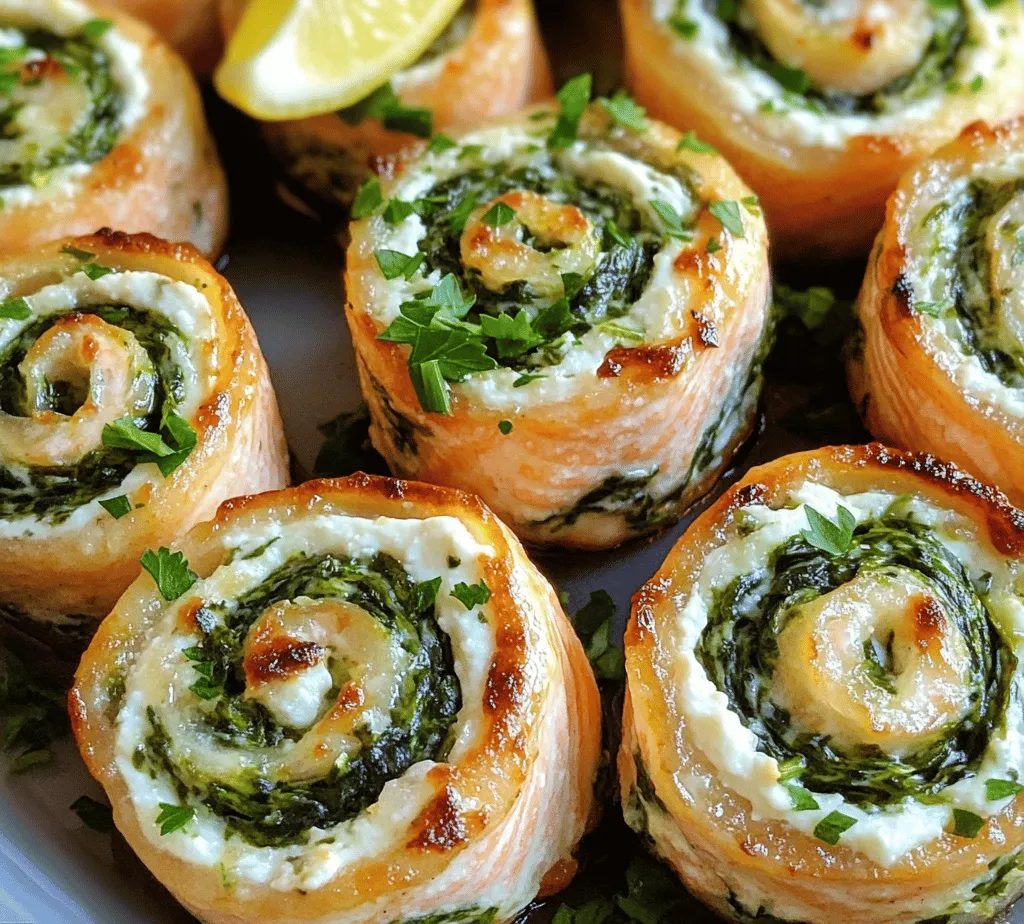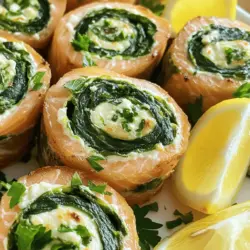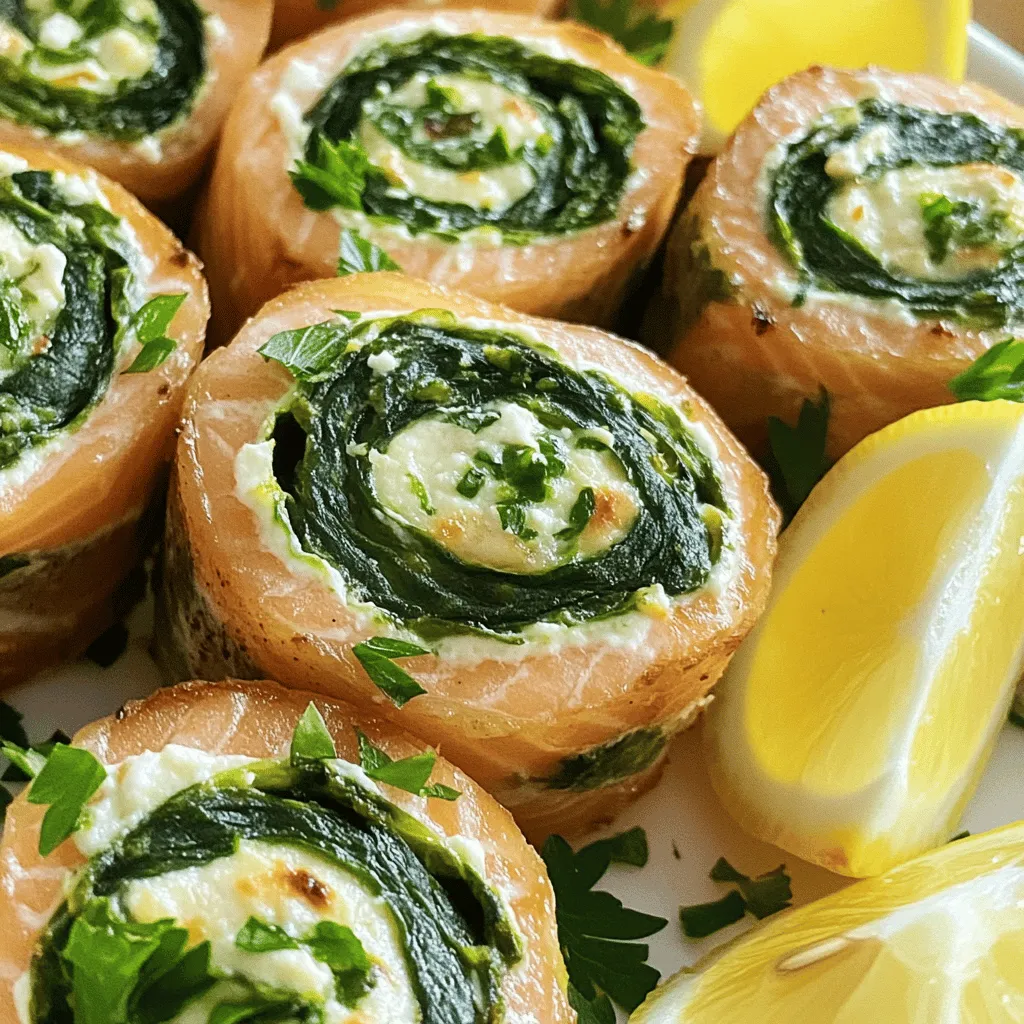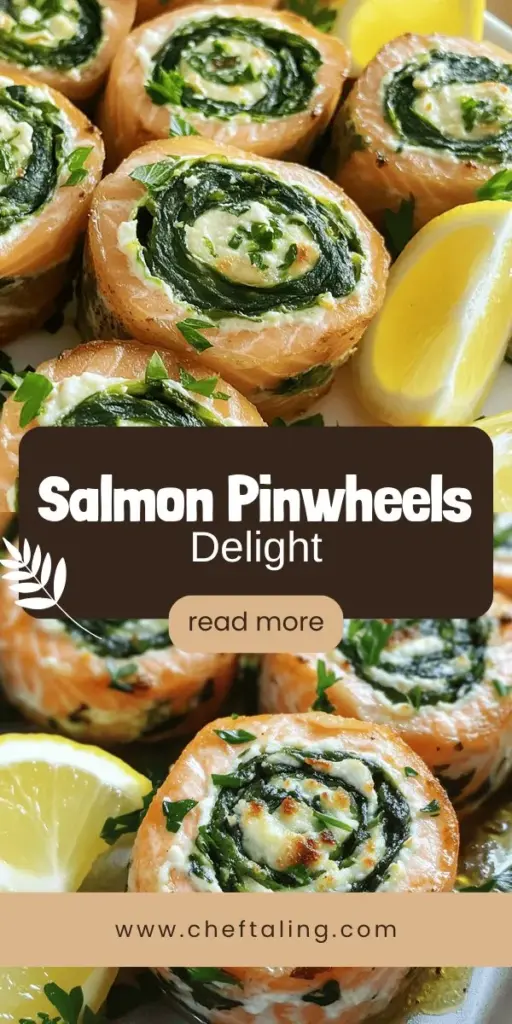Introduction
Stuffed Salmon Pinwheels are an exquisite dish that combines the rich, savory flavors of salmon with a creamy, herb-infused filling that is as pleasing to the eye as it is to the palate. This visually stunning entrée not only impresses guests but also makes for a delightful family meal. The pinwheels are easy to prepare and can be customized with your favorite ingredients, making them versatile for any occasion, from casual weeknight dinners to elegant gatherings.
Salmon, the star of this recipe, is often celebrated for its incredible health benefits. Rich in omega-3 fatty acids, protein, and essential vitamins, salmon is known to support heart health, reduce inflammation, and promote brain function. Coupled with fresh spinach, which is packed with vitamins A, C, and K, as well as iron and antioxidants, this dish becomes a powerhouse of nutrition. Together, these ingredients create a meal that is not only delicious but also nourishing.
In addition to the health benefits, there’s something special about creating visually appealing meals. Stuffed Salmon Pinwheels create a beautiful presentation on the plate, with the vibrant green of the spinach peeking through the pink of the salmon. This not only excites the taste buds but also entices the eyes, making it a dish that’s perfect for any dining experience.
So, if you’re ready to embark on a culinary adventure that combines health, beauty, and flavor, follow along as we delve into this easy-to-follow recipe for Stuffed Salmon Pinwheels.
—
Understanding the Ingredients
To create the perfect Stuffed Salmon Pinwheels, it’s essential to understand each ingredient’s role and benefits. Here’s a detailed breakdown of what you’ll need for this delicious dish:
Salmon Fillets
The foundation of our pinwheels is fresh salmon fillets. Not only is salmon a culinary favorite for its rich, buttery taste, but it is also one of the healthiest fish you can eat. Salmon is high in omega-3 fatty acids, which are essential for heart health, reducing the risk of cardiovascular disease. They also play a vital role in brain function and development.
When sourcing salmon, it’s best to choose wild-caught varieties whenever possible, as they tend to have higher levels of omega-3s compared to farmed salmon. Freshness is key; look for fillets that are firm to the touch, have a bright color, and smell like the ocean—not fishy.
Fresh Spinach
Next, we have fresh spinach, which adds not only a vibrant color but also a wealth of nutrition to your pinwheels. Spinach is low in calories yet rich in vitamins and minerals. It contains high levels of Vitamin K, which is important for bone health, and magnesium, which supports muscle and nerve function. Additionally, spinach is packed with antioxidants that help combat oxidative stress in the body.
If fresh spinach is not available, you can substitute it with frozen spinach, but make sure to thaw and drain it well to avoid excess moisture in your filling.
Ricotta Cheese
Ricotta cheese provides a creamy texture and a mild flavor that complements the salmon and spinach beautifully. It binds the filling together while adding richness to the dish. If you’re looking for a substitute, you can use cream cheese or cottage cheese, though you may want to adjust the seasoning to match the flavor profile you desire.
Seasonings
The flavor of your Stuffed Salmon Pinwheels is greatly enhanced by a blend of seasonings. Garlic powder and onion powder add depth and a savory aroma, while a pinch of nutmeg introduces a warm, nutty flavor that pairs well with the creaminess of the ricotta. Salt and black pepper are essential to elevate the natural flavors of the ingredients, ensuring a balanced taste.
Olive Oil
Olive oil is not just a cooking fat; it’s a key player in the health benefits of this recipe. Rich in monounsaturated fats, olive oil is known for its heart-healthy properties. It also contains antioxidants and anti-inflammatory compounds. When preparing your pinwheels, use high-quality extra virgin olive oil for the best flavor.
Lemon Zest
A touch of lemon zest brightens the dish, adding a refreshing citrus note that cuts through the richness of the cheese and salmon. This zest not only enhances the flavor but also provides a beautiful aroma as the pinwheels cook.
Fresh Parsley
Finally, fresh parsley isn’t just for garnish—it adds a burst of flavor and a pop of color. Parsley is a great source of vitamins A, C, and K, along with several antioxidants. Chopping some fresh parsley and adding it to the filling will elevate the overall taste profile of your pinwheels.
—
Preparation Steps
Preparation is crucial in achieving the best results for your Stuffed Salmon Pinwheels. A well-organized kitchen and a clear understanding of the steps involved will make the process enjoyable and efficient. Here’s how to prepare for this delicious dish:
Step 1: Preheat the Oven
Before you start assembling your pinwheels, preheat your oven to 375°F (190°C). This ensures that the salmon cooks evenly and thoroughly, resulting in a perfectly flaky texture.
Step 2: Prepare Your Workspace
Clear your countertop of any clutter and gather all your ingredients. Having everything in place will streamline the cooking process and make it easier to follow the recipe. You’ll need a cutting board, knife, mixing bowl, and a baking dish for the finished pinwheels.
Step 3: Prepare the Salmon
Begin by laying your salmon fillets skin-side down on a clean cutting board. Depending on the thickness of your fillets, you may want to gently pound them with a meat mallet to ensure even cooking. This step can also help to flatten the fillets, making them easier to roll.
Step 4: Make the Filling
In a mixing bowl, combine the ricotta cheese, fresh spinach, garlic powder, onion powder, nutmeg, salt, and black pepper. Mix well until all the ingredients are thoroughly incorporated. This filling should be creamy and flavorful, offering a delicious contrast to the tender salmon.
Step 5: Assemble the Pinwheels
Spread an even layer of the spinach and ricotta filling over each salmon fillet, leaving a small border around the edges. Starting from one end, carefully roll the salmon fillet tightly, ensuring the filling doesn’t spill out. Secure the roll with toothpicks if necessary, and repeat this process for each fillet.
—
These initial steps set the stage for creating beautiful and delicious Stuffed Salmon Pinwheels. By understanding each ingredient’s role and preparing your workspace effectively, you’re already on your way to impressing your family and friends with this stunning dish. Stay tuned for the next part, where we will delve into cooking instructions and tips for achieving the perfect pinwheels.

Mixing the Filling: Tips for Consistency and Flavor Balance
Creating the perfect filling for your stuffed salmon pinwheels is crucial for achieving a delightful balance of flavors and textures. Begin by selecting a base for your filling, such as cream cheese or ricotta, which provides a creamy texture. If you’re aiming for a healthier version, consider using Greek yogurt as a substitute.
When mixing your ingredients, it’s important to ensure they are well-combined but not overmixed, as this can lead to a gummy texture. Start with your base and gradually incorporate finely chopped herbs like dill, chives, or parsley, which add freshness. Consider adding a hint of acidity with a splash of lemon juice or a teaspoon of Dijon mustard to brighten the flavors.
To achieve the right consistency, aim for a spreadable mixture that will hold together but not be overly thick. If your filling feels too stiff, a little milk or olive oil can help to loosen it up. Taste as you go, adjusting the seasoning with salt and pepper, and consider adding ingredients like capers or sun-dried tomatoes for an extra flavor kick.
Preparing the Salmon Fillets: Techniques to Flatten and Roll
The next step in making stuffed salmon pinwheels involves preparing your salmon fillets. Choose fillets that are uniform in thickness, ideally about one inch thick. This ensures even cooking and makes rolling easier. If your fillets are thicker, you may want to gently pound them to an even thickness using a meat mallet or a rolling pin, placing a sheet of plastic wrap over the salmon to prevent tearing.
Once flattened, lay the salmon skin-side down on a cutting board. Use a sharp knife to trim any uneven edges, which will make it easier to roll. Spread your prepared filling evenly across the surface of the salmon, leaving about an inch of space from the edges. This prevents the filling from spilling out when you roll the pinwheels.
To roll the salmon, start at one end and carefully lift the edge of the fillet, tucking it over the filling. Roll tightly but gently to maintain the integrity of the salmon. If desired, you can use kitchen twine or toothpicks to secure the roll, ensuring it holds its shape during cooking.
Assembling the Pinwheels: Avoiding Common Mistakes
When assembling your stuffed salmon pinwheels, there are a few common pitfalls to avoid. First, ensure that your filling isn’t too wet, as excess moisture can cause the pinwheels to unravel or become soggy during cooking.
Another common mistake is overpacking the filling. While you want a generous amount, overfilling can lead to difficulties in rolling and the potential for leaks. Stick to a thin, even layer.
When rolling, be careful not to pull too tightly, as this can cause the salmon to tear. Instead, aim for a snug but gentle roll. If using toothpicks to secure the pinwheels, be mindful to remove them after cooking to prevent any sharp surprises for your diners.
Cooking Techniques: Searing vs. Baking
Once your pinwheels are assembled, you have two primary cooking methods to choose from: searing and baking. Searing, typically done on the stovetop in an oven-safe skillet, provides a delicious, crispy exterior while keeping the inside tender and juicy. This technique is best when you want a quick cooking time and a caramelized surface.
On the other hand, baking allows for even cooking throughout and is an excellent choice if you’re preparing multiple servings, as you can easily fit several pinwheels in the oven at once. If you choose to bake, preheat your oven to 375°F (190°C) and place the pinwheels in a greased baking dish.
Importance of Using an Oven-Safe Skillet
If you decide to sear your pinwheels, using an oven-safe skillet is crucial. This allows you to start cooking on the stovetop and finish in the oven without transferring the pinwheels to another dish. Cast iron or stainless steel skillets are ideal due to their ability to withstand high heat and provide even cooking.
Tips for Perfect Cooking Times and Temperatures
For perfect pinwheels, aim for a cooking time of about 12-15 minutes, depending on the thickness of your salmon. If searing, cook for about 4-5 minutes on each side, then transfer to the oven for an additional 5-10 minutes. When baking, check for doneness after 12 minutes.
Understanding Doneness: How to Tell When Salmon is Perfectly Cooked
To ensure your salmon pinwheels are perfectly cooked, use a food thermometer to check the internal temperature. Salmon is considered fully cooked at 145°F (63°C). Alternatively, you can check for doneness by gently flaking the salmon with a fork; it should be opaque and flake easily.
Serving Suggestions: Creative Presentation Ideas
Presentation can elevate your stuffed salmon pinwheels from a simple meal to a gourmet experience. Slice the pinwheels into rounds, showcasing the colorful filling, and arrange them on a platter. Consider serving with a drizzle of balsamic reduction or a light lemon sauce for added flair.
Pairing Ideas: Suggested Sides and Sauces
When it comes to sides, consider pairing your pinwheels with seasonal vegetables, such as roasted asparagus or sautéed spinach, which complement the richness of the salmon. A light salad with arugula, cherry tomatoes, and a citrus vinaigrette can also provide a refreshing contrast.
Importance of Garnishing with Parsley and Serving with Lemon Wedges
Don’t forget to garnish your dish! Fresh parsley adds a pop of color and freshness, while lemon wedges allow guests to squeeze fresh juice over their pinwheels, enhancing the flavors.
Nutritional Information: Breakdown of Calories and Macronutrients
A serving of stuffed salmon pinwheels typically contains around 300 calories, with approximately 30 grams of protein, 20 grams of fat, and 2 grams of carbohydrates. This dish is not only delicious but also packed with nutrients that are beneficial for your health.
Health Benefits of the Dish: Protein Content, Vitamins, and Minerals
Salmon is renowned for its high protein content and omega-3 fatty acids, which are beneficial for heart health and brain function. Additionally, the filling ingredients like herbs and cream cheese or Greek yogurt provide vitamins A and C, calcium, and probiotics (in the case of yogurt), making this a well-rounded meal.
Discussion on the Balance of Flavors and Nutrients
The stuffed salmon pinwheels masterfully balance rich, savory flavors with the freshness of herbs and the brightness of lemon. This harmony not only tantalizes the taste buds but also makes for a dish that feels indulgent yet nourishing.
Conclusion: Recap of the Delights of Cooking Stuffed Salmon Pinwheels
Cooking stuffed salmon pinwheels is a delightful experience that combines elegance with simplicity. From the satisfying process of mixing and rolling to the rewarding moment of plating your dish, every step is a celebration of culinary creativity.
Encouragement to Experiment with Variations and Personal Touches
Feel free to experiment with different fillings and spices to make this dish your own. Whether you prefer a Mediterranean twist with olives and feta or a spicy kick with jalapeños and cream cheese, the possibilities are endless.
A Note on the Satisfaction of Creating a Gourmet Meal at Home
Creating gourmet meals at home, like these stuffed salmon pinwheels, offers a unique satisfaction that comes from both the cooking process and the enjoyment of sharing your culinary creations with loved ones. Try this recipe today, and relish the delight of a homemade meal that’s sure to impress.


